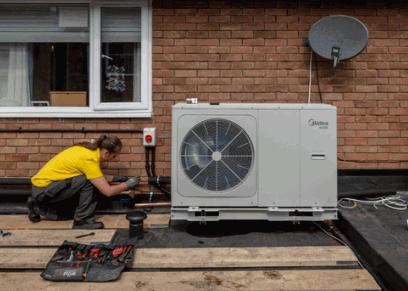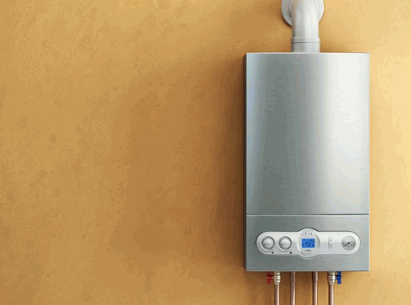Heat pumps, such as air source heat pumps (ASHPs) and ground source heat pumps (GSHPs), are becoming increasingly popular in the UK as a way to heat homes efficiently and reduce reliance on fossil fuel boilers.
However, one common concern seems to be noise pollution, with some consumers complaining about the amount of noise their heat pumps produce. Also, those living nearby have claimed, in some cases, that heat pumps are far too noisy and are disturbing their peace.
So, is this a serious issue? Are heat pumps noisy neighbours?
In this Heat Pump Gang blog, we’re examining the sound levels of ground and air source heat pumps to find a definitive answer.
To do this, we’ll need to examine the technical elements of each type of heat pump to understand what makes them tick and how much noise they really make!

Air source heat pumps work by extracting heat energy from the outside air and sending it indoors via a heat exchanger.
The main culprits behind any noise they produce are the compressor and the external fans. Think of the compressor as the heart of the system, squeezing the outdoor air to extract heat, while the fans push away the cooler air.
The good news is that these produce similar noise levels to what you might hear from a typical domestic refrigerator, which operates at around 40 decibels (dB). ASHPs typically produce a range of between 40 and 60 decibels at a distance of one metre.
Here's where things get even better: distance plays a big role. As you move further away from the unit, the sound level will drop significantly. By the time it reaches your neighbours' property line, it should be well below any official planning requirements set by the UK government. These requirements ensure all heating products, like ASHPs, comply with strict noise limitations. So, while the unit might emit a hum when you're standing right next to it, it shouldn't be disruptive to your neighbours or your own peace and quiet when enjoying your garden.
Other components include the condenser, expansion valve, and evaporator, all of which can emit a low buzzing sound, although this is rarely an issue for most people.
Discover: Advantages And Disadvantages Of Air Source Heat Pumps

Ground source heat pumps take a different approach to extracting heat. Instead of relying on the outside air, they tap into the constant and reliable temperature of the ground. They achieve this through a clever network of pipes called a source heat pump loop buried beneath your property. This loop acts like a giant underground radiator, constantly absorbing heat from the earth.
The magic of GSHPs lies in their ability to transfer this captured heat to your home without the need for a noisy external fan. Unlike air source heat pumps, GSHPs rely on a circulation pump that quietly moves a water-based solution through the underground loop and the internal heating system. This circulation process generates a minimal amount of noise, typically around 42 decibels (dB) or even less when measured from a metre away. Imagine the sound of a quiet refrigerator hum – that's the kind of noise level you can expect from a ground source heat pump.
This quieter operation is a major advantage of GSHPs, especially for those who value peace and quiet in their homes. Because there are no external fans whirring away, GSHPs blend seamlessly into the background, allowing you to enjoy the comfort of a warm home without any disruptive noise.
Explore further: What Is A Ground Source Heat Pump?

Noise levels should be checked during the heat pump installation process, and all reputable, professional installers will ensure that this procedure is performed accurately.
They should follow the microgeneration installer standard and make sure your external fan is installed correctly and that it presents minimal disturbance to any neighbouring property.
If they're doing the job properly, your heat pump installer will follow these steps:
They'll consider the manufacturer's specific noise output data. This data typically shows the decibel level produced at different power capacities (how hard the unit is working).
The installer will assess your property and surroundings. This includes factors like the distance from the proposed location to your neighbours' property lines and the presence of any potential sound barriers, such as fences or hedges.
Some installers might use specialist software to predict the noise levels at various points around your property based on the chosen heat pump model and its planned location.
When you book Heat Pump Gang to have your heat pump installed, you can rest assured that the positioning will be planned carefully and that every effort will be made to reduce the noise level.
Heat pumps produce vibrations when the warm air passes through the heat exchanger, although this changes depending on how much work the pump does at the time. Your installer will select suitable materials to reduce the vibration level or fit an anti-vibration mount.

While some heat pumps can produce more noise than the average gas boiler at close range, proper installation is key. A professionally installed heat pump, positioned carefully and at an appropriate distance from your property line, shouldn't be disruptive.
Gas boilers can also generate noise from ignition and pressure flow, although modern combi-boilers have a similar noise level to heat pumps, between 40 and 60 decibels.
So, there doesn't seem to be much difference between the two, so why have heat pumps developed a reputation for being noisy?
This is probably because earlier models were, in fairness, much louder than more recent units. However, the technology has been upgraded and improved to reduce the noise level and increase efficiency.
Even so, negative reviews and opinions are difficult to shift, especially when they are continually repeated by those who are reluctant to embrace sustainable energy methods.

We've covered some of the measures used by professionals, but to round things off, let's run down the list of everything we know about reducing the noise heat pumps produce...
Take a look: Heat Pumps For Flats
From what we've learned, it's clear that heat pumps do make some noise, mostly when they are working harder. However, the noise isn't too loud - at least, it shouldn't be if it's fitted correctly and care is taken over the placement of the various components.
Overall, the intensity of the noise will vary depending on the air velocity, design, pump speed, and power capacity of your chosen pump. Even so, modern heat pumps should never be too noisy!
The benefits of this technology definitely outweigh any drawbacks. Heat pumps are significantly more efficient than fossil fuel boilers, helping you save money and reduce your carbon footprint.
The quiet operation of GSHPs and the decreasing noise levels of ASHP technology make them a great choice for a sustainable and comfortable home. Although heat pumps usually require a larger upfront investment compared to traditional boilers, their efficiency can lead to significant cost savings in the long run.
Any real issues with noisy heat pumps are either exaggerated or can be overcome through professional fitting, high-quality heat pumps, and proper maintenance.
Finally, heat pump installations are only going to increase, especially as the government plans to install 600,000 by 2028, and Heat Pump Gang is honoured to be involved in this drive for a greener future.




